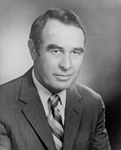| |||||||||||||||||
| |||||||||||||||||
 County results Williams: 40–50% 50–60% 60–70% Gross: 40–50% 50–60% | |||||||||||||||||
| |||||||||||||||||
| Elections in New Jersey |
|---|
 |
The 1970 United States Senate election in New Jersey was held on November 3, 1970. Incumbent Democrat Harrison A. Williams defeated Republican nominee Nelson G. Gross with 54.02% of the vote.
Contents
- Background
- Democratic primary
- Candidates
- Campaign
- Results
- Republican primary
- Candidates 2
- Campaign 2
- Results 2
- General election
- Candidates 3
- Campaign 3
- Debates
- Endorsements
- Polling
- Results 3
- References
Primary elections were held on June 2, 1970. [1] Williams held off a challenge from the Hudson County party organization in the form of State Senator Frank Guarini, while Gross prevailed over two candidates without organizational support. [2]


